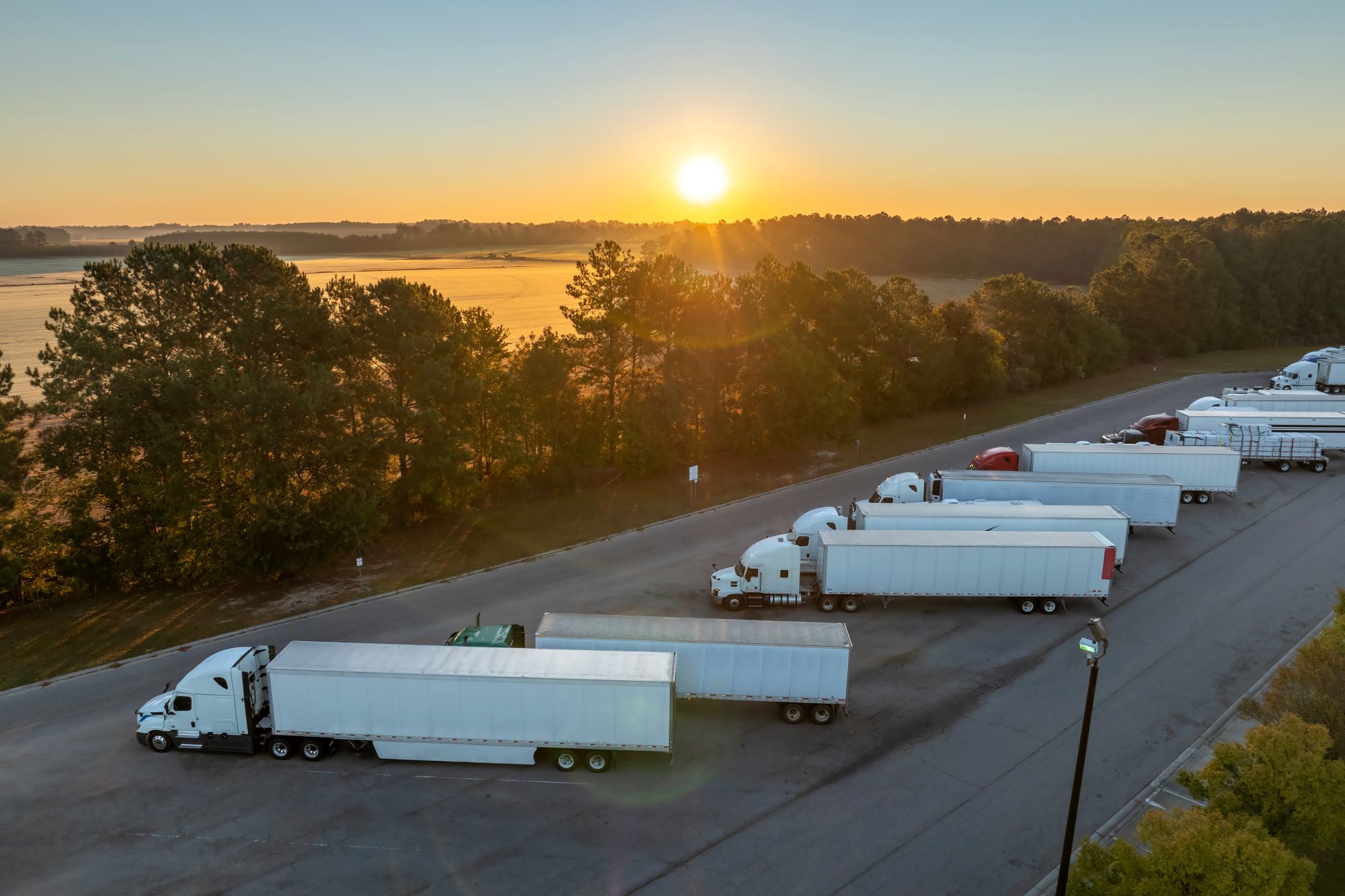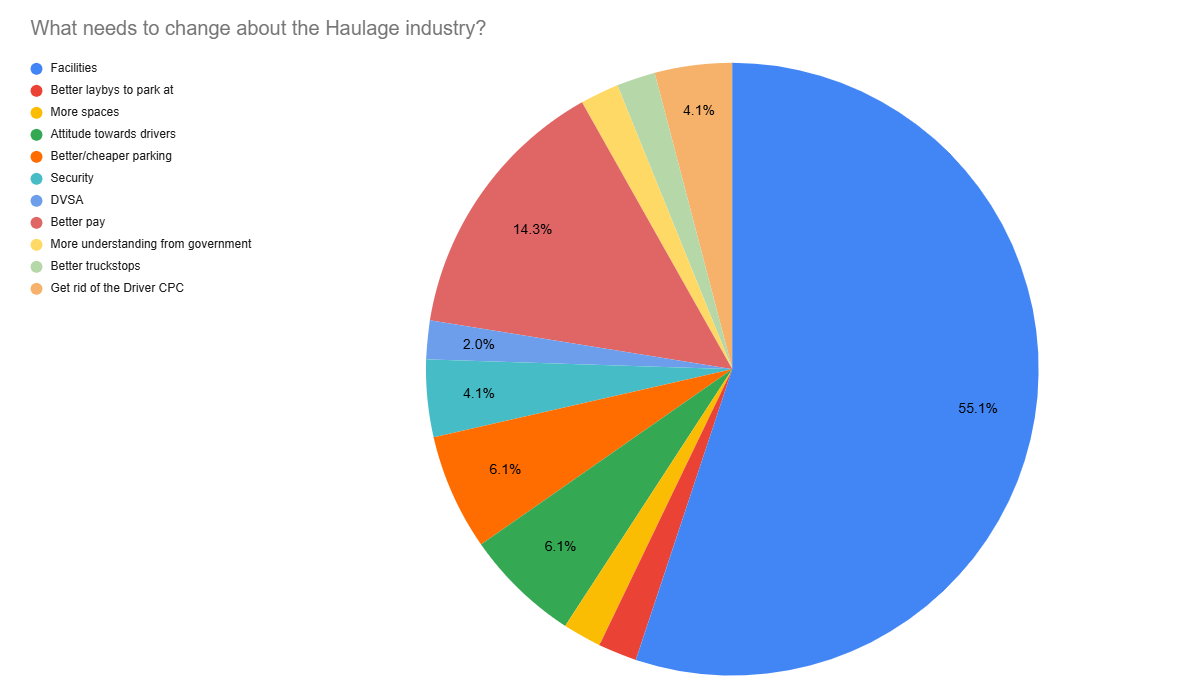
Susie Jones
Kierowcy ciężarówek wzywają do reformy branży
Utworzony: 05.02.2025
•
Aktualizacja: 05.02.2025
Obecnie kobiety-kierowcy samochodów ciężarowych w Wielkiej Brytanii stanowią zaledwie 1% wszystkich kierowców - liczba ta wzrosła o 144% w ciągu ostatniej dekady, ponieważ wprowadzono więcej inicjatyw promujących różnorodność i wypełniających lukę w niedoborze kierowców.
Artykuł Fleetpoint opisuje wiele sposobów, w jakie branża może przyciągnąć więcej kobiet:
Kultywowanie wspierającego i przyjaznego środowiska pracy.
Modernizacja infrastruktury i udogodnień.
Elastyczna i przyjazna rodzinie organizacja pracy.
Tworzenie jasnych ścieżek rozwoju kariery.
Mimo to kierowcy w [mediach społecznościowych] (https://www.facebook.com/photo/?fbid=988050383364634&set=a.482170237285987&locale=en_GB) argumentowali, że te długotrwałe wyzwania w branży muszą zostać rozwiązane dla wszystkich, zanim zostaną wprowadzone nowe inicjatywy mające na celu zlikwidowanie niedoboru kierowców.
Niedobór kierowców - gdzie jest teraz branża?
Niedobór kierowców był stałym problemem branży transportowej, ale po COVID-19 i Brexicie osiągnął poziom krytyczny. W 2024 r. w Europie, Norwegii i Wielkiej Brytanii brakowało ponad [233 000] (https://www.iru.org/news-resources/newsroom/half-european-truck-operators-cant-expand-due-driver-shortages#:~:text=More%20than%20half%20of%20European,no%20significant%20action%20is%20taken.) kierowców ciężarówek - liczba ta ma przekroczyć 745 000 do 2028 r. ze względu na starzenie się siły roboczej.
Branża wciąż zmaga się z konsekwencjami i pracuje nad wdrożeniem nowych inicjatyw w celu promowania różnorodności, poprawy warunków pracy i wypełnienia luki kadrowej.
Rząd wdrożył w przybliżeniu [33](https://www.gov.uk/government/topical-events/hgv-driver-shortage-uk-government-response/about#:~:text=We%20extended%20dangerous%20goods%20(ADR,to%20take%20refresher%20training%20now.) działania mające na celu zaradzenie niedoborowi kierowców samochodów ciężarowych w Wielkiej Brytanii. Obejmują one między innymi:
Zwiększenie wydajności istniejących łańcuchów dostaw.
Zapewnienie wsparcia i szkoleń dla nowych kierowców pojazdów ciężarowych.
Rozszerzenie możliwości testowania kierowców pojazdów ciężarowych.
Usprawnienie procesów licencyjnych.
Poprawa warunków.
Zapewnienie stabilności łańcucha dostaw paliw.

Co należy zmienić? Kierowcy mają swoje zdanie.
49% kierowców w mediach społecznościowych stwierdziło, że zmiany muszą być wprowadzane niezależnie od płci - przy czym 27% kobiet kierowców HGV zgodziło się, że sektor musi ewoluować dla wszystkich. 24% stwierdziło, że praca nie jest już atrakcyjna, co podkreśla potrzebę zmian w branży. Co zatem chcieliby zmienić kierowcy?
Udogodnienia
55% chciałoby, aby udogodnienia zostały ulepszone dla wszystkich:
"Potrzebne są lepsze udogodnienia i lepsze traktowanie. Cała branża jest w rozsypce, a my jesteśmy źle traktowani".
"Udogodnienia są okropne dla wszystkich kierowców, mężczyzn i kobiet".
W listopadzie 2024 r. ankieta [Transport Focus] (https://www.britsafe.org/safety-management/2024/uk-truckers-why-more-action-is-needed-to-make-their-working-lives-safer-and-healthier#:~:text=Improving%20roadside%20facilities&text=Drivers%20have%20long%20been%20telling,asked%20expressed%20dissatisfaction%20with%20both.) wykazała, że dwie trzecie kierowców było niezadowolonych z obiektów postojowych dla ciężarówek - z brudnymi udogodnieniami, słabymi opcjami żywieniowymi i brakiem przestrzeni socjalnej powodującymi poważne problemy.
Rząd i branża transportowa podjęły znaczące działania, inwestując 14 milionów funtów w innowacje i poprawę warunków pracy.
W październiku 2024 r. 23 wybranym wnioskodawcom przyznano do 4,5 miliona funtów na ulepszenie ich postojów dla ciężarówek. Modernizacje obejmą nowe prysznice, restauracje i ulepszone funkcje bezpieczeństwa, aby zapewnić kierowcom większy spokój ducha. Ponadto w ramach programu powstanie około 430 miejsc parkingowych dla pojazdów ciężarowych.
Wynagrodzenie
Lepsze wynagrodzenie znalazło się na drugim miejscu, a 14% kierowców stwierdziło, że wyższe płace zachęciłyby więcej osób do pracy w branży:
"Uczyń ją atrakcyjną dla wszystkich, podnieś płace".
Zwiększenie wynagrodzeń będzie wiązać się ze znacznymi kosztami dla liderów branży. Gdyby średnia pensja kierowcy ciężarówki wzrosła zgodnie z krajową płacą minimalną, operatorzy flot mogliby być narażeni na dodatkowe 1,5 miliarda funtów rocznie.
Mimo to inwestycje poprawią wskaźniki retencji, zmniejszą wydatki na rekrutację i obniżą koszty szkoleń. Oferowanie wyższych wynagrodzeń nie tylko sprawiłoby, że zawód ten stałby się bardziej atrakcyjny dla nowych osób, ale także pozwoliłoby docenić kluczową rolę, jaką kierowcy odgrywają w utrzymaniu łańcucha dostaw.
Stosunek do kierowców
Na przestrzeni lat opinia publiczna na temat kierowców ciężarówek znacząco ewoluowała. Życie kierowców ciężarówek było często romantyzowane w filmach i popularnych mediach - co prowadziło wielu do przekonania, że mają łatwo. Jednak przedstawiano ich również jako ciężko pracujących bohaterów, których wizerunek z czasem uległ pogorszeniu.
Pod koniec XX wieku postrzeganie zmieniło się, gdy warunki pracy stały się trudne, a kierowcy ciężarówek zostali obdarzeni niesprawiedliwymi stereotypami - często z powodu fałszywych informacji w mediach, a czasem z powodu kilku niedoświadczonych kierowców. Te negatywne stereotypy zostały złagodzone podczas pandemii COVID-19, kiedy wzrosło publiczne uznanie dla kierowców ciężarówek.
Obecnie kierowcy ciężarówek cieszą się szacunkiem, jednak branża ta nadal jest nękana negatywnymi stereotypami i postawami. Coś, co 6% kierowców chciałoby zmienić:
"Myśląc o Covid, zostaliśmy uznani za bohaterów, ale potem wszystko wróciło do normy. Nic dziwnego, że obecni kierowcy, mężczyźni i kobiety, chcą odejść z branży. Mają już dość śmieciowego traktowania, z jakim spotykają się na co dzień".
"Byłoby miło nie być traktowanym jak szumowina".
W ostatnich latach rozwój mediów społecznościowych zaczął rzucać wyzwanie i zmieniać negatywne postrzeganie. Wielu kierowców korzysta z platform takich jak TikTok i Instagram, aby dzielić się spostrzeżeniami na temat swojej roli, rozwiewać błędne przekonania i zdobywać szacunek osób spoza branży.
Informacje zwrotne wskazują na pilną potrzebę wprowadzenia zmian w branży transportowej w celu przyciągnięcia i zatrzymania obecnych i nowych kierowców. Niedostateczna reprezentacja kobiet pozostaje poważnym wyzwaniem, a inwestowanie w obiekty zaspokajające ich potrzeby ma kluczowe znaczenie. Inwestycje te muszą być jednak inkluzywne i przynosić korzyści całej sile roboczej.

W jakich krajach brakuje kierowców ciężarówek?
Kraje w Europie ucierpiały najbardziej, a wiele firm transportowych nie jest w stanie rozwinąć swojej działalności, ponieważ nie mogą znaleźć wykwalifikowanych pracowników.
W Europie populacja kierowców ciężarówek starzeje się, a [średnia wieku wynosi 47 lat] (https://www.iru.org/news-resources/newsroom/half-european-truck-operators-cant-expand-due-driver-shortages#:~:text=The%20EU%2C%20Norway%20and%20the,an%20average%20age%20of%2047.). Jedna trzecia kierowców ciężarówek ma ponad 55 lat i oczekuje się, że przejdzie na emeryturę w ciągu najbliższych dziesięciu lat. Co więcej, mniej niż 5% kierowców ciężarówek w Europie ma mniej niż 25 lat - co podkreśla lukę, która pozostanie po przejściu na emeryturę starzejącej się siły roboczej.
Czy istnieje dzień uznania dla kierowców ciężarówek?
HGV Drivers Day odbywa się 22 stycznia i został ustanowiony przez NN1 Personnel. Dzień ten ma na celu uczczenie kierowców ciężarówek i wszystkiego, co robią dla gospodarki i społeczeństwa.
Jakie są prognozy dla branży transportowej na 2025 rok?
Z naszego bloga [The Road Ahead for 2025] (https://snapacc.com/newsroom/the-road-ahead-for-2025-truck-industry-trends-to-expect/) spodziewamy się, że w tym roku w branży transportu ciężarowego ważne będą następujące kwestie:
Wykorzystanie zalet sztucznej inteligencji.
Walka z różnicą płci i niedoborem kierowców.
Promowanie bardziej ekologicznego przemysłu.
Zwiększenie przewozów długodystansowych.


